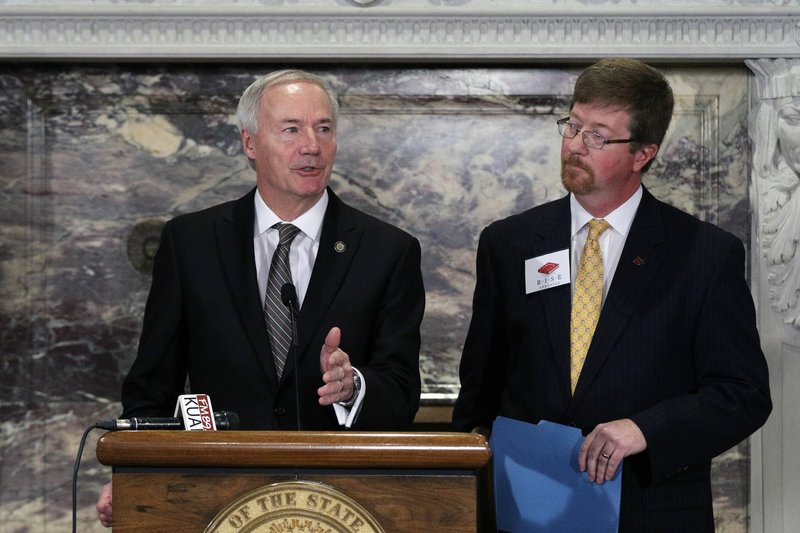About 1,000 Arkansas teachers of kindergarten, first- and second-grade classes will have the opportunity next summer and into the 2017-18 school year to receive training on the science of reading and instructional strategies.
The training is one element of a new, multifaceted effort to improve lackluster student reading skills, as evidenced by standardized test results, and to generally create a culture of reading across the state.
The initiative will also include reading academies for teachers of older students in 2018-19, an annual reading and dyslexia conference for educators, a social media book-talk campaign, support for local reading and book distribution drives, and the education of parents on the importance of early literacy.
Gov. Asa Hutchinson and state Education Commissioner Johnny Key on Thursday announced the formation of the Reading Initiative for Student Excellence to a crowd that included second graders from Little Rock's Martin Luther King Jr. Elementary School and representatives of education and reading advocacy organizations.
"We in Arkansas have to develop the strongest reading program and proficiency that we can possibly do for the sake of our children," Hutchinson said. "And the reason it is important is because it is the foundation for education. Everything else hinges on the ability to read proficiently," he also said, adding, "It brings joy in life, as well."
Thirty-one percent of Arkansas fourth-graders and 27 percent of eighth-graders scored at proficient levels on the 2015 National Assessment of Educational Progress in reading. The test is given to a representative sample of students nationwide every other year. Students scoring at a proficient level shows mastery of the skills appropriate for their grade level.
"That tells me two things," Hutchinson said about the proficiency rates. "First we have to do better ... in preparing students for learning to read, and secondly, we see a decline in proficiency levels as some of the students go through the grades. We not only have to teach them early on ... but we have to [improve] that reading skill and that appetite for reading as they go through school."
Children in poverty on average receive only 24 hours of one-to-one reading time compared with as many as 1,700 hours of one-to-one reading time for children of more affluent families, Hutchinson said. The new initiative is meant to help children who aren't exposed to reading and literacy skills at home.
The goals of the initiative are to increase student reading proficiency by 10 percent in three years, move Arkansas out of the bottom one-third of states on reading test results within five years, increase the percentage of students who score at college-ready levels on the ACT college entrance exam, and improve teacher capacity to teach reading -- including phonics.
Key said the reading initiative is "a call to action." If successful, it will be transforming for students as well as for the general welfare of the state, including the economy, he said.
Key and the governor said the initiative is affordable with existing but re-allocated funds at the Education Department. The initiative and its emphasis on phonics can be done without changing the state's recently revised English and language arts standards, Key said. What is needed is a new focus on the science of reading, Key also said.
Stacy Smith, the Education Department's assistant commissioner of learning services, said recent laws calling for services to students with dyslexia revealed gaps in teacher knowledge about reading instruction.
The Education Department is sponsoring the training of 80 people in the agency and in the state's educational service cooperatives using the professional development series "Language Essentials for Teachers of Reading and Spelling." Those being trained now will help with the teacher academies next summer and beyond.
"For so many teachers, we don't understand the English language and how sounds fit together and what are the rules to spelling," Smith said, referring to the science of teaching. "We quit teaching that and so many people in the field of education don't know it because it wasn't taught to them. This is about building the depth of knowledge for the teachers themselves so they can teach reading."
Metro on 01/27/2017
